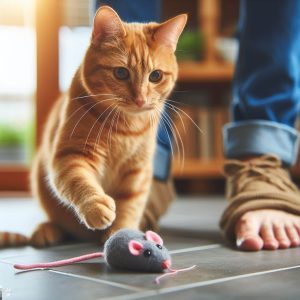Cats, with their large, beautiful eyes, often experience minor eye issues like discharge, irritation, or redness. When this happens, our first instinct may be to reach for the human eye drops in the medicine cabinet. But is this safe for our feline friends? Should you ever use human eye drops in a cat’s eyes?
As cat owners, we want to provide the best possible care for our furry companions. But their eyes are more delicate than ours and require specific medication formulated just for them.
In this comprehensive guide, we’ll cover everything you need to know about using human eye drops on cats. You’ll learn:
- The risks of using human eye drops on cats
- When it may be okay to use human eye drops on cats
- The best eye drop options for cats
- Proper dosage and administration of cat eye drops
- Signs of eye irritation or complications in cats
- Expert tips for keeping your cat’s eyes healthy
Let’s start by understanding why human eye drops are generally not recommended for cats.
The Risks of Using Human Eye Drops on Cats
Cats’ eyes differ from human eyes in a few key ways that make them poorly suited for our eye drops:
Smaller Eye Size
A cat’s eyes are much smaller than human eyes. As a result, human eye drop medication can be too strong and get overconcentrated in their eyes.
A human eye drop is formulated to distribute across our larger surface area. But in a cat’s tiny eyes, it may overdose the area.
Different pH Balance
The pH balance of a cat’s eyes is different from a human’s. Their eyes are more alkaline.
Human eye drops are designed for the acidity level of the human eye. When used in cat eyes, the pH can get disrupted, causing irritation.
Medication Differences
The active medications in human eye drops like tetrahydrozoline or antibiotics are formulated for human eyes.
Some ingredients like Tetrahydrozoline, a common decongestant in eye drops, can be toxic to cats if absorbed into their system.
Lack of Regulation
Since they aren’t designed for feline use, human eye medications aren’t regulated for appropriate cat dosage. It’s easy for cat owners to administer too high or too frequent a dose.
Chronic Use Dangers
While an occasional use may be harmless, chronic long-term use of inappropriate human eye drops can actually damage cats’ eyes.
It could lead to complications like glaucoma, cataracts, corneal ulcers and blindness with long-term use.
So while we may think we’re helping our cats by using a human product, it can often do more harm than good in their uniquely sensitive eyes. It’s important we don’t take shortcuts with their eye care.
When May It Be Okay to Use Human Eye Drops on Cats?
While human eye drops come with risks, veterinary experts say there are some limited situations where it may be acceptable to use them on a cat:
In a True Emergency
If your cat is suffering severe eye pain or irritation and you have absolutely no access to veterinary care or proper cat eye medication, a very limited use of human eye drops may provide temporary relief.
This is a “better than nothing” scenario only and not ideal eye care. But a couple doses could calm bad swelling, irritation or buy you time to get proper vet treatment.
Sterile Preservative-Free Formulas
If using human eye drops in an emergency on a cat, ONLY use preservative-free sterile formulas. Look for labels clearly indicating this.
Preservatives commonly found in drops can be very irritating to cats’ eyes. A sterile, preservative-free formula avoids this extra irritation.
Saline Eye Drops
In gentle eye irritation situations, veterinarians say sterile saline eye drops are generally safe and can be used on cats. They provide moisture and help flush out discharge.
Saline doesn’t contain active medication, just the same components found in natural tears. So it avoids the pH issues of medicated drops.
Very Short Term Use
At most, a couple doses of human eye drops may be okay for a day or two max in an urgent situation with no other options. But chronic long-term use is very inadvisable.
The key is to get an actual diagnosis and prescription cat eye medication from a vet ASAP. Don’t self-diagnose or self-treat. Get professional feline medical advice.
So while human eye drops come with risks, they may be used minimally and very temporarily on cats when absolutely needed. But it’s always best to see your vet and use cat-specific drops. Let’s go over proper dosage and administration next.
Proper Dosage and Administration of Eye Drops for Cats
When using any eye drops in a cat, special care must be taken to get the dosage right and avoid harm. Here are some tips:
Smaller Volume of Drops
Only use 1-2 drops MAX in a cat’s eyes per use. Their eyes are so small that even a few drops overdoses them.
With human drops, start with just 1 drop and see how they react before considering a second drop.
No Touching Eye Area
Never allow the dropper tip to touch the eye area. This can risk eye injury or contaminate the medication. Hold drops above the eye and let them drip in to avoid contact.
Restrain Cat Properly
Have someone gently hold and calm your cat while administering drops. Keep them still and their eyes accessible. Place one hand over their eyes to open lids.
Tilt Head Back
Tilt your cat’s head back to help the drops absorb properly in their eyes rather than spill out.
Tap Corner of Eye
Tap the corner of the eye near the nose after dropping so the medication is distributed well across the eye.
Monitor for Issues
Watch your cat closely after administering drops. Look for signs of irritation like pawing at their eyes, squinting, blinking excessively or dilated pupils.
See the Vet Quickly
Never use human medication longer than 1-2 days max. Get an actual diagnosis and cat prescription drops ASAP. Chronic use can be very risky.
By using extreme care with drop dosage, restraint and monitoring cats, human eye drops may be used minimally in emergencies. But a vet should prescribe specific feline eye drops as soon as possible.
The Best Eye Drop Options for Cats
To properly and safely treat a cat’s eye issues, a vet needs to diagnose the specific problem and prescribe suitable feline eye medication. Some options vets may provide include:
Antibiotic Eye Drops
Eye infections in cats often require antibiotic drops to clear up bacterial causes. Vets can prescribe antibiotic drops formulated specifically for cats.
Anti-Inflammatory Eye Drops
For inflammation and swelling, steroid eye drops for cats can ease irritation while healing damage that occurred.
Tear Stimulant Drops
Cats with dry eye may get ophthalmic drops to increase tear production and moisture.
Glaucoma Drops
Medications like beta blockers help control eye pressure in cats with glaucoma and prevent blindness.
Anesthetic Eye Drops
To perform eye exams and procedures, vets use anesthetic drops that numb and dilate cats’ eyes temporarily.
Allergy Eye Drops
For cats with seasonal eye allergies, antihistamine drops provide relief and reduce itchy reactions.
There are many specialized prescription feline eye drops vets can provide based on the diagnosed problem. Human drops simply can’t safely substitute for proper veterinary care. Don’t take chances with over-the-counter products.
Watch for Signs of Eye Irritation in Cats
If you ever use human eye drops in a cat, monitor them closely afterwards for adverse effects like:
- Excessive blinking, squinting or pawing at eyes
- Holding eyes shut
- Redness or swelling
- Dilated or constricted pupils
- Increased tear production or discharge
- Avoiding light, rubbing face on objects
- Hiding or acting reclusive
These signs indicate the drops are irritating their eyes or that the underlying issue is getting worse. Discontinue any human drops immediately and call your vet. Irritation suggests the drops are inappropriate and may be damaging.
Even with prescribed cat eye drops, call the vet if you notice any worrisome eye reactions. But human drops often cause irritation since they’re too harsh for cats.
Expert Tips on Keeping Your Cat’s Eyes Healthy
To avoid emergency eye issues in cats, implement some preventative health practices:
- Gently wipe eyes daily – Use a warm, damp cloth to gently wipe away any eye discharge daily. This prevents buildup.
- Watch for signs of injury – Cats can damage eyes playing, fighting or exploring. Look for cuts, scratches, swelling or discoloration.
- Inspect eyes in bright light – Sit cats near a window or brightly lit area and inspect their opened eyes for issues.
- Keep away irritants – Don’t let cats access chemical cleaners, foreign objects, plants, dusty areas that could get in their eyes.
- Feed an optimal diet – Provide foods rich in Vitamin A, C, E and omega fatty acids to keep eyes healthy.
- Control parasites – Fleas and ear mites near eyes can cause irritation and infection. Use preventative treatments.
- Practice infection control – Wash hands and disinfect surfaces to limit contagious eye infections between pets.
- Avoid injury during grooming – Carefully cut mats around eyes and trim eye area nails to prevent scratch injuries.
With diligent eye health practices, emergency issues may be less likely. But see a vet at the first sign of eye trouble for proper diagnosis and care. Never take shortcuts.
Conclusion: See Your Vet for Cat Eye Issues
In summary, it’s best practice to not use human eye drops in cats whenever possible. Their eyes differ greatly from ours and require a vet’s expertise.
But in an emergency with no other options, one or two very limited applications of sterile saline or preservative-free drops may be acceptable temporarily to provide minor relief until proper treatment is reached.
Always monitor cats closely for irritation and get veterinarian-prescribed medication ASAP. Never use old medications or random over-the-counter products in feline eyes.
With some diligence on preventive eye health, we can help our cats avoid many eye problems. But issues inevitably crop up in active, curious cats. Seek proper veterinary care right away if you notice any eye troubles.
Don’t take chances with do-it-yourself care that could potentially injure their eyes and vision permanently. Your cat’s eyes are precious – handle with extreme care!



